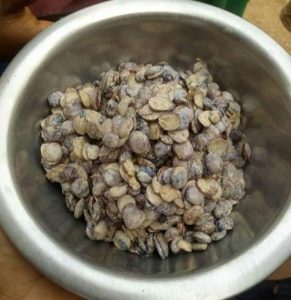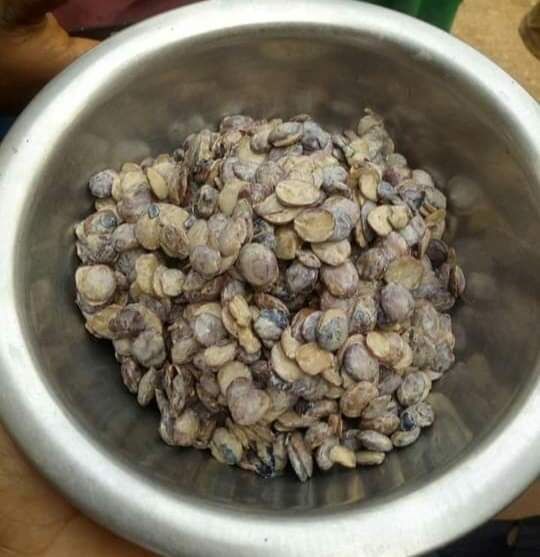What are the health benefits of locust beans (Iru, Dawadawa, Ogiri)? See the Nutritional value,benefits, content, composition of fermented african locust beans. Uses of locust beans.
Welcome to www.nimedhealth.com.ng
What are the health benefits of locust beans (Iru, Dawadawa, Ogiri)?
First, let us look at other details…
Common name: Locust Beans ,carob tree,
Botanical /Scientific name: Parkia biglobosa
Family name : Leguminosae
Other local names: Ogiri in Igbo ,Iru in Yoruba, Dawadawa (Hausa)
Locust bean, is a local seasoning or condiment used in soups and stews. Locust bean when boiled and fermented becomes a black strong smelling tasty seasoning, rich in nutrients. Before the evolution of foreign seasonings like like Maggi, Locust beans Was The 👑 king of rural dwellers special delicacies. African locust bean popularly used in seasoning traditional soups has shown promise in boosting cellular immunity in immune-compromised persons, as well as, in management of diarhhoea, diabetes, and heart attack. It could also serve as antidote to snake bites.
👉Parkia biglobosa popularly known as the African locust bean tree is known in Yoruba as Igba, or Irugba, in Kasem as Choo, and in lbo as Ogili.
🍲They are used for local seasoning of soups, from dried powdered okro soup, Ofada sauce, Alefu soup, bitter-leaf soup (Onugbu in Ibo) to palm nut soup. They come with sometimes, offensive odour, but make delicious meals.
🌰NUTRITIONAL VALUE OF LOCUST BEANS (Ogiri)🌰
The African locust beans seeds contain 35% protein, 16% carbohydrate and 29% lipid while the bark contains between 12 to 14% tannin. The pod contains 60% carbohydrate whereby 10 to 20% of this carbohydrate is sucrose, with a 29 milligram of vitamin C per 100 gram of the pod. The husk is made up of 27 to 44% tannin. The ripe sweet yellow pulp of the locust beans contains 60% simple sugar (except maltose), higher sucrose and cellulose but less ascorbic acid. Parkia biglobosa is also an excellent source of essential vitamins and minerals such as calcium, fat, potassium, ascorbic acid and phosphorus. The seeds also have some antinutritional contents such as tannin, phytate and oxalate.
📌Note: if you are on a Low Carb or Ketodiet take ogiri in moderation because of it’s high carbonhydrate content might stall or affect your weight-loss plan. We advise you eat meals with ogiri occasionally.
What are the health benefits of locust beans (Iru, Dawadawa, Ogiri)?
👇BENEFITS OF OGIRI (African Locust Beans)
🎆 Culinary Purposes
African locust bean is mainly used as an aromatic condiment for seasoning assorted traditional soups such as palm fruit soup (banga soup), bitter leaf soup (ofe onugbu), melon (egusi soup), corchorus soup, African salad (abacha) and ayamase stew etc.
👉Locust beans and fertility
African Locust beans (dawadawa) helps boost both male and female fertility. Locust beans for example, can boost sperm count in males and ovulation in females.

🎆 Anti-oxidizing Properties
Parkia biglobosa has a very strong free radical scavenging and reducing abilities and as such can be used as an antioxidant for detoxifying the body. The fruit has a remarkable amount of polyphenols that accounts greatly for its anti-oxidizing properties. The anti-oxidizing properties of the fruit extracts of Ogiri are very similar to that of ascorbic acid.
🎆Wound Healing Properties
The bark of the African locust beans can be crushed, ground, soaked and boiled for preparing herbal tea for treating and healing wounds.
🎆Treatment of Hypertension
The fruits are normally used in folk medicine for treating hypertension.
🎆Boosts the Immune System
Researchers reveal that the African locust beans are useful for boosting the immune system, especially in immunocompromised individuals.
🎆Dental Care
The bark can be infused, soaked and boiled for use as a mouthwash and for treating toothache.
🎆Dermatological Care (healthy skin)
The root, bark, pod and leaves of the African locust beans can be infused, soaked and used for bathing by individuals suffering from skin infections such as leprosy and sores. It can also be applied to the skin to soothe burns.
🎆Treatment of Respiratory Infections
It can be macerated (infused or soaked in liquid) for treating respiratory infections such as pneumonia, bronchitis, cold, cough and fever.
🎆Treatment of Gastrointestinal Disorders
African locust bean is a rich source of tannins and as such both the seeds, roots, stems, barks, fruits, flowers and leaves can be used for treating gastrointestinal diseases such as diarrhoea and ulcer.
🎆Ocular Care
The roots of the locust bean are used in folk medicine for preparing lotion for sore eyes. Studies reveal that it helps to promote good eyesight.
👉Locust beans and fibroid
There are claims that fermented african locust beans could drink fibroid masses. Some folklores believe that drinking locust beans water cures fibroids. These claims are however, not backed by science.
🎆Reduction of Blood Pressure
The leaves contain procyanidin, which has been proven effective in reducing blood pressure. They significantly reduce the diastolic blood pressure more than the systolic blood pressure.
🎆Anti-malarial Properties
Researchers reveal that Parkia biglobosa is very effective for treating malaria. Both the leaves, pods, stems and barks can be macerated and used as an herbal remedy for tackling malaria.
🎆Antibacterial Properties
African locust bean plant contains antibacterial properties that are similar to those of streptomycin and as such can be used for preventing and treating bacterial infections
🎆Construction Purposes
Thick extracts of the locust bean pods are normally used for construction purposes as it offers elasticity to ceramics, walls and floors. The binding nature of the husks is due to its constituents of tannins and their polymeric nature. These attributes help to make the surface of ceramics, walls and floors waterproof.
🎆Soap Production
The oil of the African locust bean contains high saponification value and as such very useful for soap production. Both the oil and the pod ash are normally used for making soap.
READ ALSO: Health benefits of sorghum leaves
🎆Textile Manufacture
African locust beans can be used alone or mixed with either starch or synthetics for producing textiles. It can equally be used as a print thickener for dyeing textiles and indigo clothes.
🎆Insecticidal Purposes
The pods can be used for making insecticidal powders for treating crops and for preventing insecticidal and pesticidal attacks.
👉Eye health
Is locust beans good for the eyes? Yes. Locust beans is rich in vitamin A, a vitamin that promote vision and prevent night blindness.
🎆Livestock Fodder
The locust beans pods are consumable and are normally fed to livestock as fodder.
🎆Fishing Bait
The green pods are normally ground and added to rivers in other to kill fishes.
🎆Other Uses of the African Locust Beans
African locust bean tree helps in erosion control, offer shade from sunlight, serves as a windbreak, used as firewood and timber for construction purposes. The roots and pods are used locally as sponges for washing and can also be used as local strings for musical instruments.
Spice and jazz up your meals with ogiri!
CREDIT:
WellNest Health Research
























